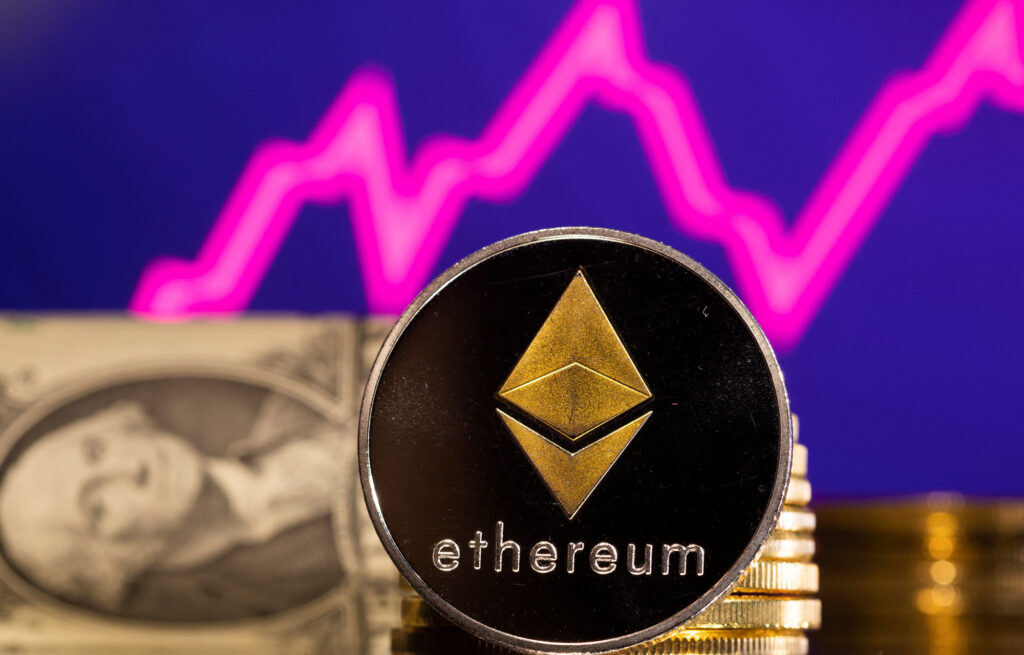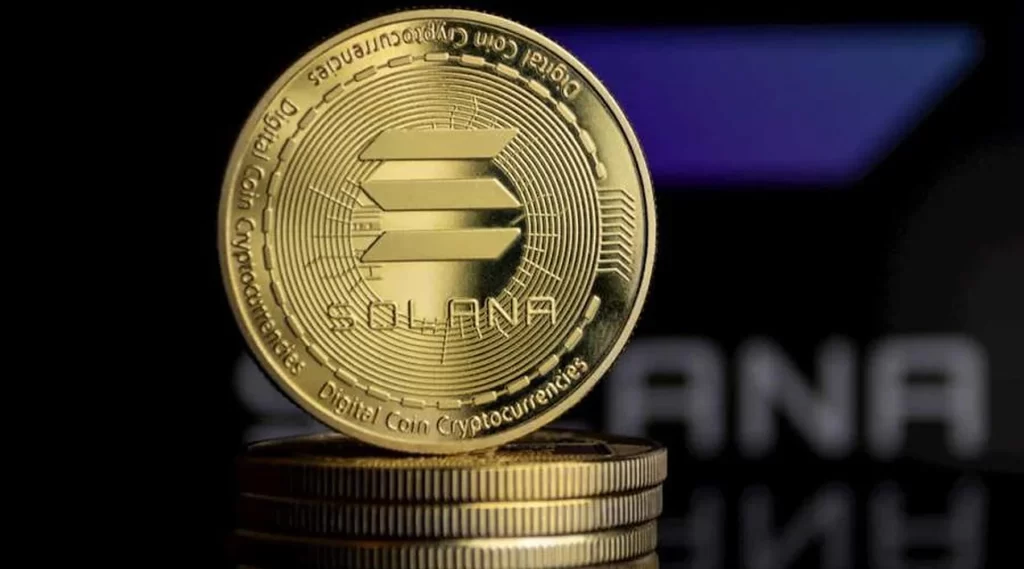Fidelity, a prominent asset management firm overseeing an impressive $4.5 trillion in assets, has joined the growing list of entities seeking approval for a spot Ether exchange-traded fund (ETF).
Their request was formally submitted to the United States Securities and Exchange Commission (SEC) on November 17.
Fidelity’s proposal centers around listing and trading shares of the Fidelity Ethereum Fund on the Cboe BZX Exchange.
The filing outlines the structure of the proposed ETF, where each share will represent a fractional undivided beneficial interest in the Trust’s net assets.
These assets will primarily consist of Ethereum (ETH), securely held by a Custodian on behalf of the Trust.
One of the primary motivations behind Fidelity’s request is to provide U.S. citizens with a secure and regulated vehicle for gaining exposure to ETH.
The filing argues that up until now, American retail investors have been deprived of a low-risk option for investing in Ethereum.
It emphasizes that the existing methods for accessing digital assets in the United States involve significant counter-party risk, legal uncertainties, and technical complexities.
In contrast, the filing points out that European investors have access to products that are traded on regulated exchanges and offer exposure to a wide range of spot cryptocurrency assets.
As an example, it mentions the approval of the Jacobi Bitcoin ETF for listing on the Euronext Amsterdam stock exchange, demonstrating the more favorable environment for cryptocurrency investment in Europe.
READ MORE:CoinShares Gains Exclusive Option to Acquire Valkyrie Funds, Eyes U.S. ETF Market Expansion
Fidelity also highlights the potential benefits of an Ether ETF for American investors, suggesting that it could have mitigated losses suffered by investors involved with now-defunct firms like FTX, Celsius Network, and BlockFi.
The filing suggests that if a Spot ETH ETP (Exchange-Traded Product) had been available, a substantial portion of the funds tied up in these defunct companies might still be held in the brokerage accounts of U.S. investors.
Fidelity’s move to seek approval for a spot Ether ETF follows BlackRock’s recent filing for a similar product, the iShares Ethereum Trust, with the SEC on November 16.
This development comes after BlackRock previously registered the iShares Ethereum Trust with Delaware’s Division of Corporations, about six months after filing its spot Bitcoin ETF application.
Notably, Fidelity is the seventh firm to apply for an Ether ETF, joining a list that includes VanEck, 21Shares, ARK Invest, Hashdex, Grayscale, and Invesco Galaxy, as the financial industry continues to explore opportunities in the rapidly evolving cryptocurrency market.
Sushi, the decentralized finance (DeFi) platform, has joined forces with interoperability platform ZetaChain to explore the potential for native Bitcoin swaps across 30 different blockchain networks.
This collaboration aims to allow users to trade BTC in a “native, decentralized, and permissionless manner” without the need for wrapping on various blockchains.
Sushi’s decentralized exchange (DEX) will be deployed on ZetaChain, integrating both its v2 and v3 automated market makers, as well as Sushi’s cross-chain swap, SushiXSwap.
ZetaChain’s core contributor, Ankur Nandwani, emphasized that this partnership could introduce Bitcoin’s extensive user base to the DeFi sector in a native manner.
He refuted arguments claiming that bridging BTC without wrapping on another chain is impossible, citing examples like THORChain that already trade Bitcoin natively with other chain assets.
Nandwani explained that ZetaChain’s approach allows anyone to build Bitcoin-interoperable decentralized applications (DApps) for settling contracts and transactions natively.
However, he acknowledged the necessity of trust assumptions, particularly regarding the decentralization of the network facilitating cross-chain transactions.
ZetaChain has successfully tested the technology on its testnet and plans to demonstrate its utility upon the launch of its mainnet through partnerships with SushiSwap and other DeFi protocols.
READ MORE: Solana (SOL) Achieves New Yearly Highs with 17% Surge after Cathie Wood’s Praise
Jared Grey, Sushi’s head chef, hailed the integration as a significant advancement for DeFi, describing the ability to swap Bitcoin natively as a “game-changer” for the industry.
He emphasized that this development opens up new possibilities for interoperability and enhanced connectivity within the DeFi ecosystem.
The integration between Sushi and ZetaChain will occur in two phases.
The first phase will see the introduction of a DEX on ZetaChain’s testnet to support basic asset swaps and liquidity provision, including beta testing and incentives for application testing.
Sushi will become one of ZetaChain’s launch partners when it deploys its mainnet, enabling full functionality for Bitcoin interoperability.
Nandwani detailed the technical process behind native BTC cross-chain swaps, explaining that a cross-chain swap contract is deployed on ZetaChain’s Ethereum Virtual Machine, allowing value to be passed to it from any connected chain, including Bitcoin.
Users initiate a cross-chain swap contract by sending a regular native token transfer transaction on Bitcoin with a special memo to a TSS address, containing the omnichain contract address on ZetaChain and the destination token and recipient address on the destination chain.
The TSS address is owned by ZetaChain’s signer validators, and once enough votes are cast, an inbound cross-chain transaction (CCTX) is created from Bitcoin to ZetaChain.
This leads to the minting of ZRC-20 BTC, which can then be swapped for other tokens on ZetaChain.
Finally, the destination token is withdrawn to the destination chain, concluding the decentralized and native BTC-to-ETH swap facilitated by ZetaChain’s network validators across connected chains.
Amy Peck, the CEO of tech-focused consulting firm EndeavourXR, emphasized the need for the crypto industry to shift its focus towards building blockchain-based solutions that benefit a broader audience, rather than pursuing quick cash grabs for brands.
Speaking at the Web Summit in Lisbon, Portugal, Peck urged Web3 companies to adopt a “build-first” mentality and create appealing products to attract newcomers.
She expressed concerns about the current trend of using Web3 and nonfungible tokens (NFTs) solely as a means for brands to generate wealth, stating that it tarnishes the reputation of an otherwise elegant technology.
Peck believes that the crypto industry has vast potential and should leverage blockchain to reinvent economic structures, inviting more individuals to participate rather than perpetuating the creation of a privileged 1%.
Peck outlined key areas that builders in the crypto space should prioritize to maximize the value of Web3.
These include establishing on-chain proof of identity, empowering individuals to control and own their data, connecting blockchain-based assets to real-world applications, and fostering participation in the creator economy.
READ MORE:Binance and Gulf Energy Join Forces to Launch Thailand-Based Crypto Exchange by Early 2024
Addressing recent industry setbacks, such as the collapse of FTX, Peck acknowledged that some clients were apprehensive about cryptocurrency and viewed Web3 with skepticism.
However, she also pointed out the existence of a “Web2.5 center lane” that larger brands could leverage while transitioning into Web3.
Peck emphasized the importance of blockchain technology in providing consumers with greater control and ownership over their data, highlighting the need for a more transparent data exchange, especially in light of emerging technologies collecting biometric data like fingerprints and facial recognition.
She expressed caution regarding cryptocurrency exchange-traded funds (ETFs), acknowledging the interest of Wall Street firms in the crypto industry but warning against attempts to reshape it to fit existing financial paradigms.
Peck emphasized the importance of preserving the core principles of decentralization and innovation that underpin the crypto sector, rather than allowing it to be manipulated by traditional financial institutions.
In conclusion, Amy Peck urged the crypto industry to prioritize building inclusive blockchain solutions and remain vigilant in preserving the integrity of Web3, resisting attempts to co-opt it for short-term financial gain.
The Texas State Securities Board has taken action against a network of companies operating under the “GS” brand based in Germany, accusing them of engaging in fraudulent activities related to digital assets and investments in a staking pool within their proprietary metaverse.
The network is reportedly controlled by Josip Dortmund Heit.
According to regulatory authorities, on November 16th, GS Partners, GS Smart Finance, and GS Wealth, under the leadership of Josip Dortmund Heit, conducted three rounds of metaverse property sales starting in September 2021.
During this period, investors were offered the opportunity to purchase XLT Vouchers or BNB Chain tokens, which represented ownership of one square inch of a unit within the company’s G999 Tower metaverse.
These tokens were initially priced at 9.63 USDT per voucher. However, their value plummeted rapidly to less than 0.0000049 USDT each on the decentralized exchange PancakeSwap after the respondents failed to meet their $175 million fundraising target.
The Texas State Securities Board also noted that the respondents had never been registered with the Securities Commissioner as dealers or agents, which is a legal requirement for conducting such financial activities.
READ MORE: Paxos Secures Initial Approval from MAS for U.S. Dollar-Backed Stablecoin Launch in Singapore
Furthermore, regulators allege that various other investment products offered by the GSB network, including Lydian World metaverse tokens, gold tokens, G999 coin, and Elemental Certificates, also constituted unregistered security offerings.
In response to these allegations, the Texas State Securities Board has filed an emergency enforcement action, demanding that the GSB group of companies immediately cease and desist from engaging in these activities within the state of Texas.
This is not the first time the GSB network has faced regulatory scrutiny.
On August 15th, the Ontario Securities Commission issued a warning, stating that GS Partners was not authorized to conduct business in the Canadian province of Ontario.
Prior to this, securities regulators in other Canadian provinces, including Saskatchewan, British Columbia, Alberta, and Quebec, had also issued warnings about the activities of GS Partners.
In conclusion, the Texas State Securities Board’s actions against the GS network of companies highlight the growing concerns surrounding unregistered security offerings and fraudulent activities in the digital asset and metaverse space.
It serves as a reminder of the importance of regulatory oversight in protecting investors and maintaining the integrity of financial markets.
The Canadian Security Intelligence Service (CSIS), Canada’s primary national intelligence agency, has expressed growing concerns regarding the use of artificial intelligence (AI) deepfakes in disinformation campaigns on the internet.
These deepfakes, which are becoming increasingly realistic, pose a significant threat to Canadians, as they are often difficult to recognize or detect.
CSIS has highlighted instances where deepfakes have been utilized to harm individuals, emphasizing the potential risks associated with this technology.
In its report, CSIS warns that deepfakes and other advanced AI technologies have the potential to undermine democracy, as certain actors may exploit uncertainty or propagate false information based on synthetic or falsified content.
This threat is exacerbated when governments are unable to prove the authenticity of their official content.
CSIS also referenced Cointelegraph’s coverage of deepfakes targeting crypto investors, particularly those featuring Elon Musk.
Since 2022, malicious actors have been using sophisticated deepfake videos to deceive unsuspecting crypto investors into parting with their funds.
Elon Musk himself issued a warning against deepfakes after a fabricated video of him endorsing a cryptocurrency platform with unrealistic returns circulated on X (formerly Twitter).
READ MORE: New York Tightens Cryptocurrency Listing and Delisting Rules to Enhance Investor Protection
In addition to the threat of deepfakes, CSIS has identified other concerns related to AI, including privacy violations, social manipulation, and bias.
The agency recommends that governmental policies, directives, and initiatives evolve in response to the increasing realism of deepfakes and synthetic media.
CSIS emphasizes the need for governments to act swiftly, as delaying interventions may render them irrelevant.
CSIS proposes collaboration among partner governments, allies, and industry experts to address the global distribution of legitimate information.
Canada has taken steps to involve allied nations in addressing AI concerns, as evidenced by the Group of Seven (G7) industrial countries’ agreement on an AI code of conduct for developers on October 30.
This code comprises 11 points aimed at promoting safe, secure, and trustworthy AI worldwide while addressing and mitigating the associated risks.
In conclusion, the Canadian Security Intelligence Service is deeply concerned about the use of deepfake technology in disinformation campaigns and its potential impact on democracy and individuals.
CSIS calls for proactive measures, international collaboration, and the development of policies to counter the growing threat posed by AI deepfakes and synthetic media.
Gas fees on Ethereum’s Layer-2 network, Polygon, experienced an astonishing surge, skyrocketing by over 1,000% to peak at $0.10.
This sudden escalation in fees was triggered by an influx of users flooding the network while minting tokens inspired by Ordinals, known as POLS tokens.
Polygon founder, Sandeep Nailwal, expressed his astonishment on Nov. 16, through a post on X (formerly Twitter), as he observed this unprecedented transactional activity.
Speculation circulated that this surge might have been linked to the launch of a new nonfungible token (NFT) collection built on the Polygon network.
The primary driver behind the surge in network activity and the subsequent spike in gas fees was the fervor surrounding the minting of POLS tokens.
Data from Dune Analytics revealed a rush of minting activity coinciding with the use of over 102 million MATIC tokens, valued at $86 million at current market prices, for gas.
READ MORE:Solana (SOL) Achieves New Yearly Highs with 17% Surge after Cathie Wood’s Praise
The POLS token is based on the PRC-20 protocol, which functions similarly to the Bitcoin Ordinals-derived BRC-20 token standard.
As per data from Ethereum Virtual Machine data provider EVM, only 8.7% of the total POLS supply has been minted, with slightly over 18,100 individuals claiming ownership of the token.
As of the time of this publication, Polygon’s gas fees have reverted to their typical levels, settling at around 882 gwei.
Gas fees measure the computational effort required to execute transactions on a blockchain, with 1 gwei being approximately equivalent to 0.000000001 MATIC.
This surge in gas fees on Polygon resembles a similar occurrence on the Bitcoin network earlier in the year.
In May, the Bitcoin network experienced a prolonged surge in activity following the release of the Ordinals protocol, allowing users to mint NFTs directly on the Bitcoin blockchain.
The ensuing frenzy for Ordinals NFTs and BRC-20 tokens led to Bitcoin fees reaching levels not seen since April 2021.
Some more traditional Bitcoin enthusiasts, like Samson Mow and Adam Back, criticized the NFT protocol and token standard as wasteful due to this development.
Solana’s SOL token has surged to new yearly highs, registering a remarkable 17% gain just a day after Cathie Wood, CEO of ARK Invest, praised the network’s efficiency and cost-effectiveness during a CNBC interview on November 15th.
Wood hailed Solana as a major player in the broader blockchain ecosystem, commending its performance in recent market conditions.
Comparing Solana to Ethereum, Wood emphasized the former’s superior speed and cost-effectiveness, stating, “Ether was faster and cheaper than Bitcoin in the day – that’s how we got Ether.
Solana is even faster and more cost-effective than Ether.” She underscored the significance of Ethereum and Solana as essential infrastructure layers within the blockchain ecosystem, capable of supporting a wider range of real-world applications compared to Bitcoin.
While the overall cryptocurrency market is experiencing an uptrend, Solana’s recent gains have outstripped those of other major cryptocurrencies, surging by an impressive 197% over the last month.
READ MORE: Poloniex Prepares to Resume Operations Following $100 Million Hack
In contrast, Bitcoin and Ether have seen more modest gains of 32% and 28%, respectively, during the same period.
As of now, Solana is trading at just over $66, according to TradingView data.
Wood also addressed the current market anticipation surrounding pending spot Bitcoin exchange-traded fund (ETF) products.
She urged investors to stay focused on the fundamental importance of Bitcoin as a catalyst for “the money revolution” and cautioned against becoming too fixated on short-term price fluctuations.
Acknowledging the possibility of a “sell on the news” scenario, where investors’ anticipation of ETF approval exceeds the market’s demand for the actual event, Wood warned of a potential rapid selloff in the days following such an approval.
In essence, Wood emphasized the importance of maintaining a long-term perspective on the transformative potential of cryptocurrencies and blockchain technology, regardless of short-term market dynamics.
Paxos, a prominent crypto infrastructure company, has achieved preliminary approval from Singapore’s regulatory authority for the establishment of a new entity dedicated to launching a stablecoin backed by the U.S. dollar.
In an announcement made on November 15th, Paxos revealed that it had received an initial endorsement from the Monetary Authority of Singapore (MAS) for its newly formed entity, Paxos Digital Singapore Pte. Ltd.
This new entity is authorized to provide digital payment token services and has intentions to introduce a stablecoin denominated in U.S. dollars, which will comply with MAS’ forthcoming stablecoin regulations.
Upon obtaining full regulatory approval, Paxos intends to collaborate with enterprise clients to facilitate the issuance of the stablecoin within Singapore.
Walter Hessert, Paxos’ head of strategy, emphasized the increasing global demand for the U.S. dollar while acknowledging the challenges faced by consumers outside the United States in accessing dollars securely, reliably, and with regulatory safeguards.
He noted that the in-principle approval from MAS would enable Paxos to extend its regulated platform to a broader international user base.
READ MORE: Global Tech Giants Unveil Ambitious Plan After Poloniex Hack
The Monetary Authority of Singapore previously outlined its regulatory framework for stablecoins on August 15th.
This framework is designed to oversee stablecoins linked to the Singapore dollar or major G10 currencies like the euro, British pound, and U.S. dollar, provided their circulation exceeds 5 million Singapore dollars ($3.7 million).
On August 7th, PayPal launched its own USD-backed stablecoin, PYUSD, which was issued by Paxos.
It’s worth mentioning that Paxos had previously minted Binance’s BUSD stablecoin, but it was compelled by the New York Department of Financial Services to cease issuing the token due to the agency’s classification of it as an unregistered security.
Paxos clarified that all of its stablecoins are fully backed by U.S. dollars and cash equivalents, underscoring their commitment to compliance.
They further highlighted their practice of issuing monthly attestations and reserve reports to ensure transparency and regulatory adherence.
This commitment to regulatory compliance aligns with Paxos’ mission to provide a reliable and secure platform for the issuance of stablecoins, catering to the growing global demand for the U.S. dollar.
Binance, the renowned cryptocurrency exchange, is set to make its presence felt in Thailand through a joint venture with Gulf Energy Development, a local energy giant.
According to a November 15 filing with the Stock Exchange of Thailand by Gulf Energy, the new venture, named Gulf Binance, will initially operate on an invitation-only basis, with plans for a public rollout in early 2024.
This initiative received the green light from the Thai Securities and Exchange Commission (SEC) on November 10, paving the way for Binance’s expansion into the Thai market.
A spokesperson from Binance confirmed that the platform’s launch has commenced with invitation-only access, with more details to follow as they become available.
Gulf Binance achieved a significant milestone on May 26 when it secured digital asset operator licenses from Thailand’s Ministry of Finance, enabling it to operate a regulated cryptocurrency exchange under the supervision of the country’s SEC.
Initially, Binance had aimed to launch its Thai branch by the fourth quarter of 2023.
Richard Teng, Binance’s regional head of Asia, Europe, the Middle East, and North Africa, emphasized the strategic importance of leveraging Gulf Energy’s local presence and network to introduce blockchain technology to Thai users.
READ MORE: Global Tech Giants Unveil Ambitious Plan After Poloniex Hack
Gulf Energy Development, founded and led by Thai billionaire Sarath Ratanavadi, is a major player in Thailand’s natural gas distribution sector.
The company is known for its diverse investments in various business sectors, including renewable power generation, infrastructure development projects, and digital infrastructure businesses.
Gulf Energy had previously invested in Binance’s United States-based subsidiary, Binance.US, through its participation in the “Series Seed Preferred Stock” issued by BAM Trading Services, the operator of Binance.US.
In recent developments, Binance collaborated with the Royal Thai Police to seize $277 million from scammers, which resulted in over 3,200 victims seeking compensation.
Tigran Gambaryan, Binance’s head of financial crime compliance, emphasized the company’s commitment to partnering with authorities worldwide to restore trust in the digital asset ecosystem.
The joint venture between Binance and Gulf Energy Development signifies Binance’s expanding footprint in the cryptocurrency market and its dedication to collaborating with local partners to promote blockchain technology adoption.
With the Thai SEC’s approval, Gulf Binance is poised to make a significant impact on the cryptocurrency landscape in Thailand.
On November 14th, Bitcoin faced a critical test as it dipped to the $35,000 support level, experiencing a significant drop in price.
In just one hour, the cryptocurrency plummeted by over $1,000, creating a sense of sell-side pressure in the market.
Fortunately, Bitcoin managed to find support at the $35,000 mark, acting as a springboard for a recovery to approximately $35,600 at the time of this report.
This sudden volatility came shortly after what initially seemed like a positive development for Bitcoin and the crypto market, with United States inflation data showing a slowdown beyond expectations.
However, it became evident that beyond smaller retail investors, there was limited enthusiasm for purchasing Bitcoin at its previous levels, which had recently reached 18-month highs.
Analysts pointed out that Bitcoin whales began to cash in on their profits on November 3rd as the BTC price surged from $35,000 to nearly $38,000. Over 15 wallets holding more than 1,000 BTC each either sold or redistributed their holdings.
An accompanying chart from on-chain analytics firm Glassnode revealed that the number of whale wallets had reached its lowest point in about a month.
Following the release of the inflation data, monitoring resource Material Indicators highlighted the need to anticipate periods of downside movements within the broader Bitcoin uptrend.
They cautioned against assuming that the market would only move upwards, emphasizing that market dynamics are more complex and require patience and conviction from investors.
A subsequent update revealed that bid support had shifted closer to the spot price, moving from $33,000 to $34,500, while whales continued to offload their holdings.
One notable development was the surge in long liquidations, with data from CoinGlass indicating the highest daily volume of long Bitcoin liquidations in several months, totaling $120 million on November 14th.
Interestingly, this amount was nearly equal to the short Bitcoin liquidations that occurred when the price spiked to $38,000 the previous week.
Furthermore, across the cryptocurrency market, long positions in various cryptocurrencies were liquidated, amounting to nearly $300 million.
In conclusion, Bitcoin’s recent price action showcased the cryptocurrency’s ongoing volatility, with fluctuations driven by factors such as profit-taking by whales and market sentiment.
Traders and investors need to exercise caution and be prepared for both upward and downward movements in the ever-evolving cryptocurrency market.













